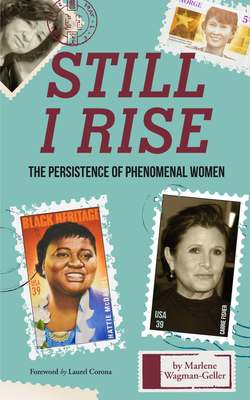Читать книгу Still I Rise - Marlene Wagman-Geller - Страница 8
На сайте Литреса книга снята с продажи.
ОглавлениеFOREWORD
Some things stagger the mind—the size of the universe, or the trillions of atoms in a single grain of sand or cells in a newborn’s little fingernail. As much beyond our grasp is the estimated one hundred billion human beings who have ever lived. This means that fifty billion women have watched the sun rise and set and the seasons pass since our species came into being.
Millions of women, we can therefore safely say, have lived what Western culture has defined as the appropriate female experience—the helpmate, the subordinate, the one who stirred the pot and darned the socks at home. Though women in our culture have far greater opportunities than in the past, a significant degree of gender stereotyping still clings to our society and rattles around unbidden and unwanted in our brains. Women have put up with mansplaining and gender bias far longer than there have been words for either, and have sold themselves short for centuries, as so many still do today. Here, in these stories of twenty-five women who overcame incredible personal and societal adversity, Marlene Wagman speaks not just for these women’s heroism, but for all the rest whose stories we will never know, and for the next generation of female heroes whose voices are better heard in classrooms, on playing fields, and in workplaces today because of the women who have come before.
Many of the stories recounted in Still I Rise are bigger than gender, though gender limitations are woven inextricably throughout. Helen Keller and Annie Sullivan struggled to overcome the ravages of a disease that couldn’t have cared less if Helen was a girl or boy. Hattie McDaniel, the first African American to win an Oscar for her portrayal of Mammy in Gone with the Wind, sat in the same separate waiting rooms and drank from the same “colored” water fountains as African American men. Having an addicted spouse, as Lois Burnham Wilson, the wife of the founder of Alcoholics Anonymous did, is devastating whether the spouse is a husband or wife. Nevertheless, there is no question that being female compounds immeasurably the other burdens and struggles of life, as Wagman shows here.
The twenty-five essays are replete with details that show evidence of Wagman’s deep research. Did you know, for example, that Keller’s eyes were replaced with glass ones for cosmetic and medical reasons? Or that McDaniel successfully pleaded with Clark Gable not to “make a scene” by boycotting the gala opening night, which she could not attend because of her race? Or that Lois Wilson endured her husband’s many other addictions, while they struggled to make the Twelve Step AA program, which had freed him from dependence on alcohol, the household word it is today? All the details are here in these thoughtful, touching, and well written essays, sprinkled throughout with signature doses of Wagman’s wry humor.
Still I Rise serves as a shout-out to all of us and our stories. I am proud to share my gender not just with the women about whom Wagman writes, but with Wagman herself, and all my sister authors who put their hearts, intelligence, creativity, and hard work into telling the stories of women who can no longer speak for themselves.
Laurel Corona
Author of Finding Emilie and The Mapmaker’s Daughter
San Diego, 2017
